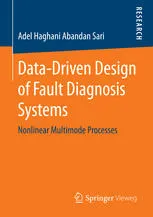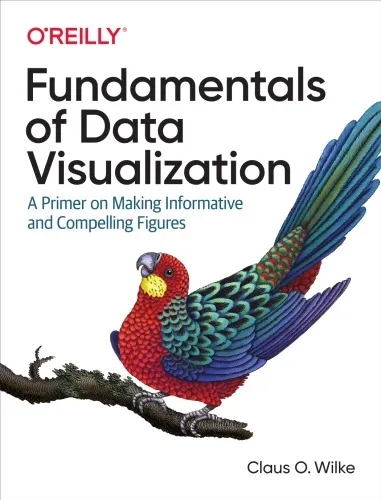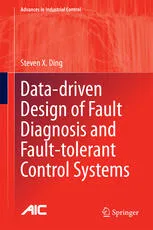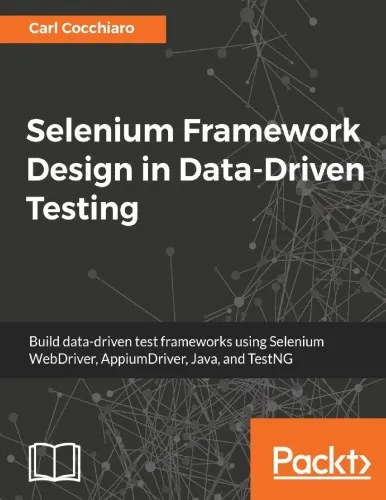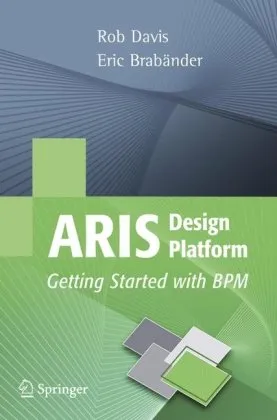Data-Driven Design of Fault Diagnosis Systems: Nonlinear Multimode Processes
4.0
بر اساس نظر کاربران

شما میتونید سوالاتتون در باره کتاب رو از هوش مصنوعیش بعد از ورود بپرسید
هر دانلود یا پرسش از هوش مصنوعی 2 امتیاز لازم دارد، برای بدست آوردن امتیاز رایگان، به صفحه ی راهنمای امتیازات سر بزنید و یک سری کار ارزشمند انجام بدینکتاب های مرتبط:
معرفی کتاب «Data-Driven Design of Fault Diagnosis Systems: Nonlinear Multimode Processes»
کتاب «Data-Driven Design of Fault Diagnosis Systems: Nonlinear Multimode Processes» یکی از منابع برجسته و ارزشمند در حوزه طراحی و پیادهسازی سیستمهای تشخیص خطا با رویکرد دادهمحور است. این کتاب تلاش دارد تا دانش فنی و پیشرفتهای را در مورد فرآیندهای غیرخطی و چندحالته ارائه دهد و راهحلهایی قابلاعتماد برای چالشهای موجود در سیستمهای صنعتی و پیچیده عرضه کند. با توجه به پیچیدگی روزافزون فرآیندهای صنعتی و افزایش نیاز به سیستمهای تشخیص خطای مقاوم و هوشمند، این اثر بهعنوان یکی از کتب محوری در این حوزه شناخته میشود.
خلاصهای جامع از کتاب
این کتاب شامل مباحث نوآورانهای است که عمدتاً بر طراحی سیستمهای تشخیص خطا در محیطهای غیرخطی و با چندین مد عملیاتی تمرکز دارند. در فصلهای مختلف این کتاب، خوانندگان با تکنیکهای پیشرفته یادگیری ماشین، مدلسازی فرآیند، و کاربرد الگوریتمهای دادهمحور در شناسایی، طبقهبندی، و مقابله با خطاها آشنا میشوند.
از آنجا که فرآیندهای غیرخطی و چندحالته معمولاً در صنایعی مانند نفت و گاز، شیمیایی، و تولید انرژی رایج هستند، این کتاب دانش عمیقی درباره کاربرد دادههای فرآیندی برای طراحی سیستمهای حساس و خودکار ارائه میدهد. با استفاده از روشهای آماری، Machine Learning و تکنیکهای Optimization، کتاب میکوشد چالشهایی همچون نویز دادهها، نامعینیها، و رفتارهای پیچیده فرآیندها را با موفقیت مدیریت کند.
نکات کلیدی کتاب
- ارائه چشمانداز واضح و دقیق به طراحی سیستمهای Fault Diagnosis برای فرآیندهای پیچیده
- توضیح تکنیکهای مدرن یادگیری عمیق و Machine Learning در تشخیص خطا
- بررسی چالشهای مدلسازی فرآیندهای غیرخطی و چندحالته و ارائه راهحل
- استفاده از دادههای صنعتی واقعی برای مثالها و مطالعات موردی
- توسعه ابزارهایی کارآمد برای ارزیابی عملکرد سیستمهای Fault Diagnosis
نقلقولهای محبوب از کتاب
"The efficacy of data-driven fault diagnosis systems lies in bridging statistical rigor with practical engineering insight."
"Understanding the multimode nature of processes is essential for building resilient diagnostic frameworks."
چرا این کتاب مهم است؟
در دنیای امروز، صنایع به شدت وابسته به تکنولوژیهای پیشرفته برای رصد و کنترل فرآیندها هستند. با افزایش اهمیت کاهش زمان توقف کاری، بهبود بهرهوری، و کاهش خطرات ایمنی، نیاز به سیستمهای Fault Diagnosis هوشمند بیش از پیش احساس میشود. این کتاب با ارائه رویکردهایی عملی، علمی و دادهمحور، هم نیازهای محققان و هم نیازهای مهندسان صنعتی را پاسخ میدهد.
علاوه بر پیادهسازی تئوریها در عمل، این کتاب به مخاطبان کمک میکند مدلسازیهای پیچیده و غیرخطی را بهتر درک کرده و سیستمهایی با کارایی بالا طراحی نمایند. با تمرکز بر استفاده عملی از دادهها و ابزارهای مدرن، این اثر برای متخصصان حوزههای مختلف از جمله کنترل فرآیند، مهندسی شیمی، و Machine Learning نیز جذاب و کاربردی است.
Introduction to "Data-Driven Design of Fault Diagnosis Systems: Nonlinear Multimode Processes"
Fault diagnosis is a critical field for ensuring the safety, reliability, and efficiency of complex industrial systems, especially in today’s highly automated and interconnected world. The book "Data-Driven Design of Fault Diagnosis Systems: Nonlinear Multimode Processes" offers a groundbreaking exploration of advanced methodologies to address the challenges posed by nonlinear multimode processes. By focusing on data-driven approaches, it bridges the gap between theoretical advancements in fault diagnosis and their practical applications on industrial systems characterized by intricate nonlinearities and multiple operational modes.
With systems becoming more sophisticated, conventional fault diagnosis techniques that rely solely on first-principles modeling often fall short, especially when applied to nonlinear and multimodal processes. This book presents a comprehensive overview of how machine learning and other data-driven strategies can revolutionize fault diagnosis frameworks. It integrates essential concepts from nonlinear dynamics, process monitoring, and artificial intelligence, providing valuable insights for researchers, engineers, and professionals who strive to build robust, adaptive, and efficient diagnostic systems.
Structured in a clear and systematic manner, this book delves into advanced data-driven methods ranging from principal component analysis (PCA) extensions to machine learning techniques, while also addressing key challenges such as handling process nonlinearity, adapting to multimode operations, and reducing false alarms. Readers will gain a deep understanding of how these techniques can be applied to enhance fault detection, isolation, and even prediction in real-world settings.
Detailed Summary of the Book
This book is divided into multiple sections, each designed to build a comprehensive understanding of data-driven fault diagnosis systems for nonlinear multimode processes. It begins by introducing readers to the fundamental principles of fault diagnosis and the specific challenges posed by nonlinear dynamics and multimodal operations.
A significant portion of the book delves into advanced data-driven methodologies, including techniques like kernel-based approaches, deep learning frameworks, and hybrid schemes. These approaches are explored in depth to demonstrate how they can model nonlinearities and manage process variations seamlessly. Moreover, there is a strong emphasis on computational efficiency and overcoming issues such as noise, data sparsity, and process complexity.
The book also highlights case studies and real-world applications to showcase the practicality and versatility of the techniques described. By integrating theoretical concepts with hands-on scenarios, readers can better grasp the deployment of fault diagnosis systems in industries such as chemical processing, energy systems, pharmaceuticals, and aerospace.
Key Takeaways
- Comprehensive coverage of advanced data-driven techniques for fault diagnosis in nonlinear multimode processes.
- In-depth discussions on machine learning, kernel methods, and deep learning for model-based diagnostics.
- A focus on handling challenges such as nonlinearity, dynamic behavior, and multiple operating modes.
- Practical insights and case studies demonstrating the implementation of fault diagnosis frameworks in industrial systems.
- Strategies for improving diagnostic accuracy, reducing false alarms, and ensuring scalability.
Famous Quotes from the Book
"The complexity of modern industrial processes necessitates paradigm shifts in fault diagnosis, moving away from traditional rules and embracing data-driven intelligence."
"A system’s resilience lies not only in its ability to operate efficiently but also in how intelligently it can detect, isolate, and recover from faults."
Why This Book Matters
As industries rapidly adopt advanced automation and control technologies, ensuring system reliability and safety has become more challenging than ever before. Faults in industrial systems can have profound implications, ranging from operational disruptions to safety hazards and financial losses. Traditional diagnostic approaches are no longer sufficient to address the complexities and dynamic nature of such systems.
By offering a comprehensive introduction to data-driven fault diagnosis techniques, this book equips researchers, engineers, and practitioners with the knowledge and tools required to design next-generation diagnostic frameworks. Its focus on handling nonlinear and multimode processes ensures its relevance across a broad spectrum of industries where these conditions are prevalent.
This book is not just a collection of methodologies; it is a roadmap for navigating the future of fault diagnosis in automated systems. By reading this book, you will be prepared to lead in the development and implementation of cutting-edge diagnostic systems that will shape the future of reliability engineering and industrial safety.
دانلود رایگان مستقیم
شما میتونید سوالاتتون در باره کتاب رو از هوش مصنوعیش بعد از ورود بپرسید
دسترسی به کتابها از طریق پلتفرمهای قانونی و کتابخانههای عمومی نه تنها از حقوق نویسندگان و ناشران حمایت میکند، بلکه به پایداری فرهنگ کتابخوانی نیز کمک میرساند. پیش از دانلود، لحظهای به بررسی این گزینهها فکر کنید.
این کتاب رو در پلتفرم های دیگه ببینید
WorldCat به شما کمک میکنه تا کتاب ها رو در کتابخانه های سراسر دنیا پیدا کنید
امتیازها، نظرات تخصصی و صحبت ها درباره کتاب را در Goodreads ببینید
کتابهای کمیاب یا دست دوم را در AbeBooks پیدا کنید و بخرید
1331
بازدید4.0
امتیاز0
نظر98%
رضایتنظرات:
4.0
بر اساس 0 نظر کاربران
Questions & Answers
Ask questions about this book or help others by answering
No questions yet. Be the first to ask!
